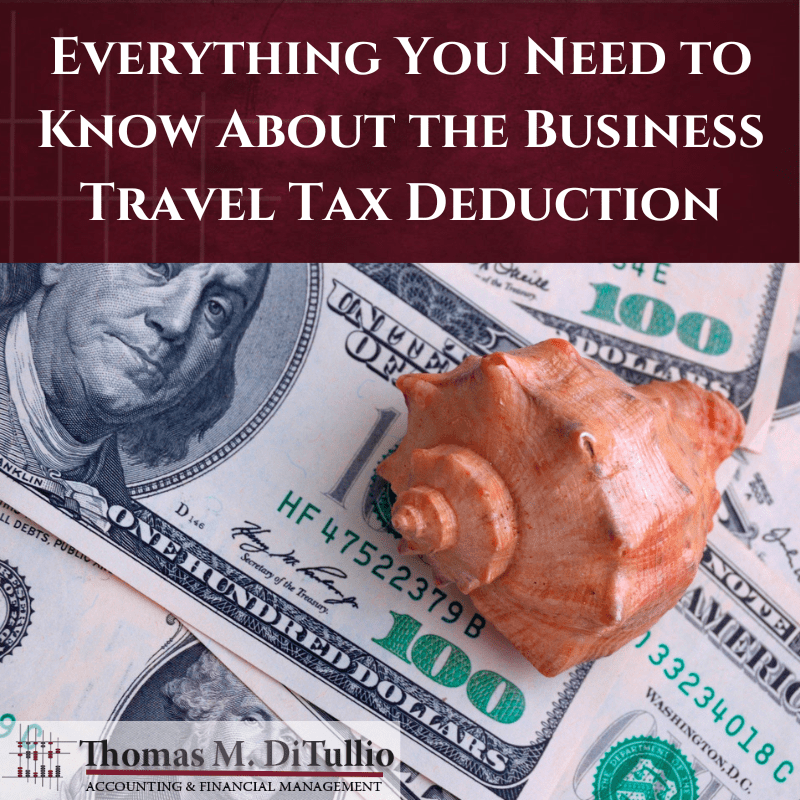Everything You Need to Know About the Business Travel Tax Deduction
Self-employed people and small business owners are generally allowed to deduct business travel expenses when they are required to travel away from home for business purposes. However, you need to ensure that you understand the definition of home from the Internal Revenue Service (IRS) and what ordinary and necessary expenses are to ensure you deduct your business travel expenses accurately. Here is what to know about the business travel tax deduction from TMD Accounting.
What Are Ordinary and Necessary Expenses?
The first thing you should understand is how the IRS defines ordinary and necessary expenses. Ordinary expenses are those that are accepted and common within your industry. Necessary expenses are those that are appropriate and helpful for your company.
How the IRS Defines Home
Your business travel expenses can be claimed when you are away from your business home, which is not necessarily where you live. The city in which your business is located is your business’s tax home, which might not be the same place where your family lives.
For example, imagine that you live in Colorado Springs, Colorado and have a permanent business location in Denver. Just because you might stay during the workweek in hotels in Denver and eat out, you won’t be able to deduct those expenses from your taxes or the costs of your transportation when you drive back to Colorado Springs on the weekends. This is because Denver will be your business’s tax home, so you can’t take deductions for your ordinary and necessary expenses during your time there.
Deductible Transportation Expenses
If you have to travel for business by bus, train, or plane, you can deduct the cost of your ticket and baggage fees. If you have to pay for a last-minute ticket, you can claim the higher price as an expense. However, if you pay for the ticket using your frequent-flyer miles, you won’t be able to deduct it.
Transportation expenses can be deducted when you have to travel away from your business’s location for business reasons. For example, if you have to fly from Denver to Los Angeles for a work conference, you can deduct the cost of your airfare to and from Los Angeles. You can also deduct the cost of renting a car in LA while you are there. The IRS allows you to deduct the actual costs or the standard mileage rate. During the first half of 2022, the standard rate was 58.5 cents per mile. For the second half, the mileage standard rate was increased to 62.5 cents per mile. You can also deduct parking fees and tolls you might have to pay during your business trip.
Deductible Taxi Fares
While you are away on business, you can also deduct the fares you pay for taxis or shuttles. The following types of fares you pay can be deducted:
- Fares paid to get to and from the airport, train station, and your hotel
- Fares paid to and from your hotel and your work location
- Fares paid to and from clients in the city
For car rentals, you can deduct the expense as long as you exclusively use the vehicle for business. if you also use it for personal reasons, only deduct the portion of the rental costs that you used for business. For example, if you are in LA and drive to the conference and then back and forth to a few client locations, you can deduct the mileage and rental car expenses for those trips. However, if you later decide to go out to dinner or a movie from your hotel, you can’t deduct the expenses involved with that.
Deductible Incidental Expenses
You can also deduct the costs of your hotel, business meals, and tips as long as they are reasonable under the circumstances. Your meal deduction is limited to half of the actual cost of your meal or the standard meal allowance. The meal allowance is based on the federal per diem rate based on when and where you travel.
In general, business travelers can only deduct 50% of their meals. However, in 2022, the IRS is allowing business travelers to deduct the full cost of business-related meals and beverages that they purchase at a restaurant. If you decide to take the standard meal allowance, the deductible amount for incidental expenses is $5 per day for tips given to staff at your hotel, baggage carriers, or porters. It is still a good idea to keep receipts and track of the actual costs you pay.
What Qualifies as a Business Trip?
To qualify as a business trip and qualify for the business travel tax deduction, your trip must meet each of the following criteria:
- Your trip caused you to leave your business’s tax home for more than a normal work day
- Your trip must primarily consist of business
- Your trip should qualify as an ordinary and necessary expense
- Your trip should be planned in advance
Speak to an Accounting Professional
If you are unsure which expenses you can deduct under the business travel deduction, you should speak to the accounting and tax professionals at TMD Accounting. We can review your receipts and the purpose of your trip and explain what can and can’t be included. To learn more, call us today at 1-856-228-2205.

